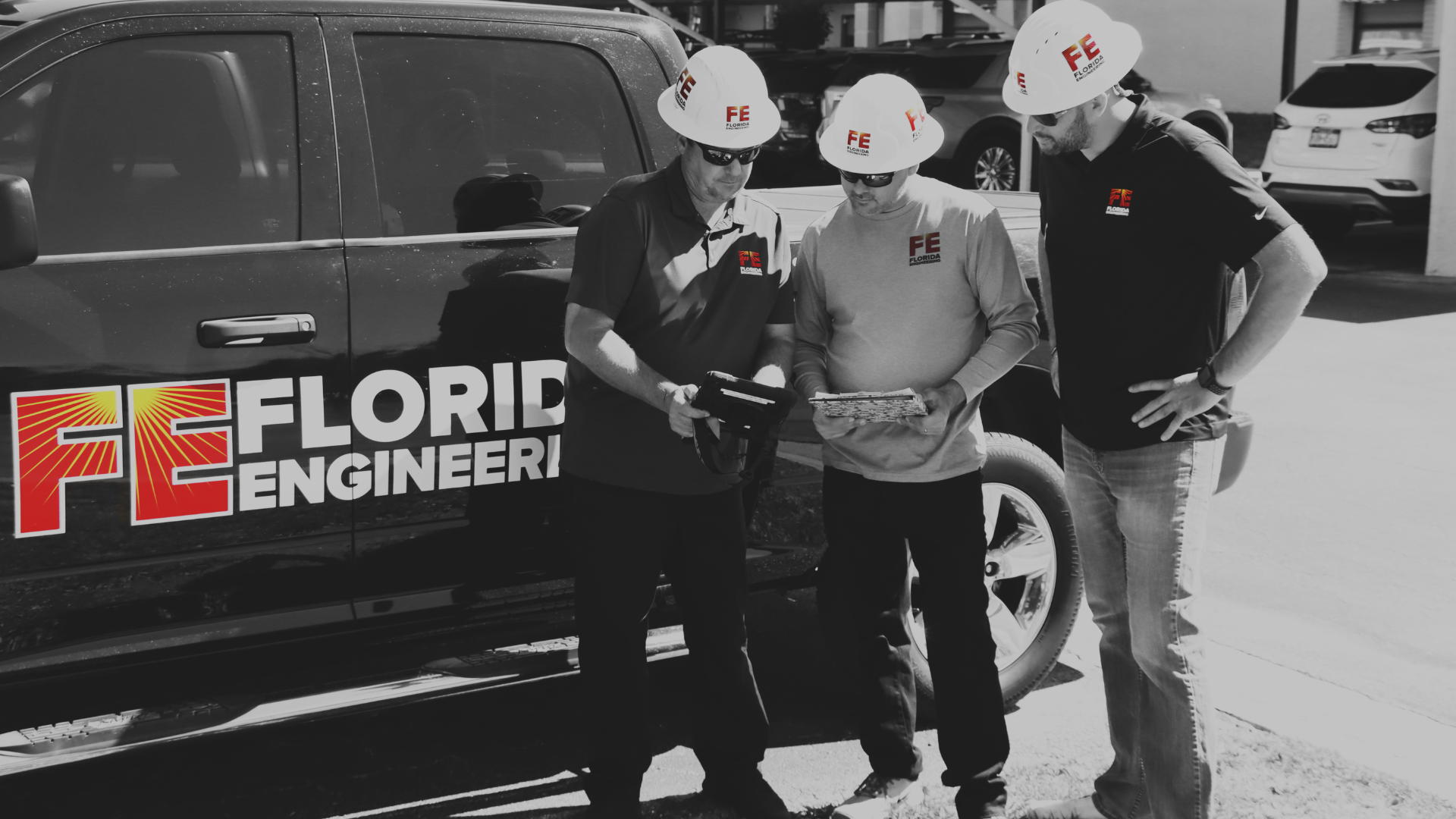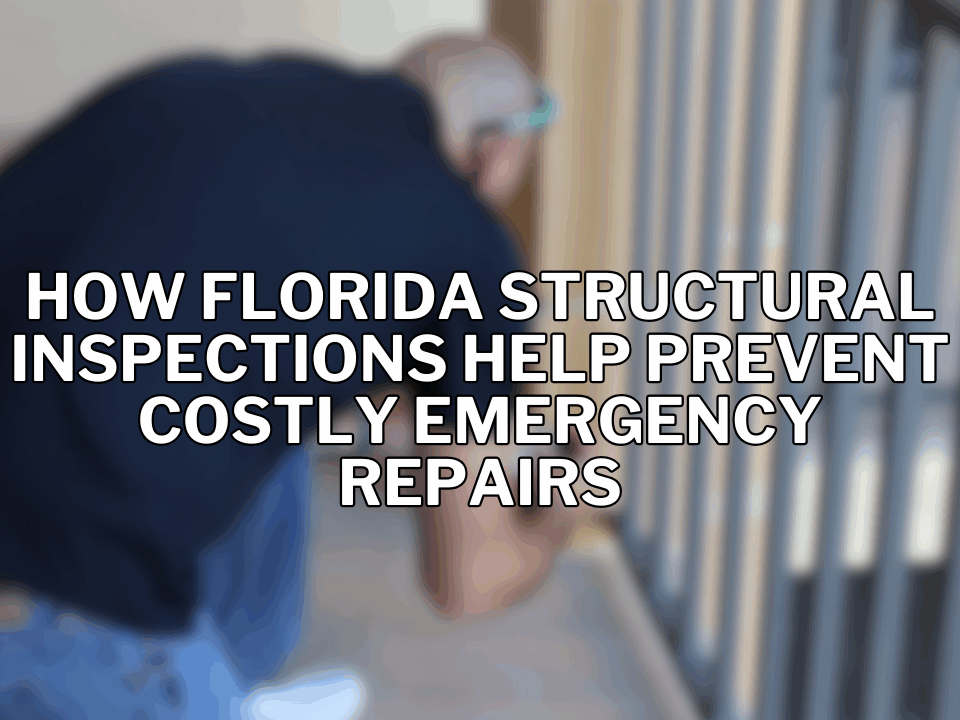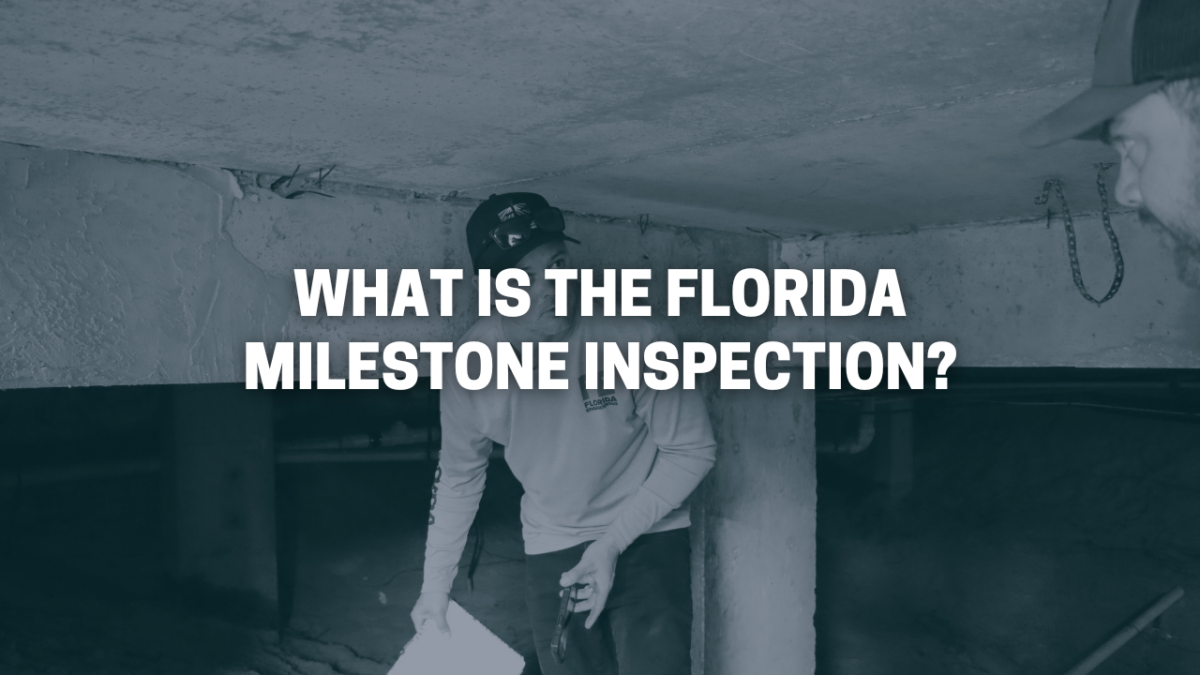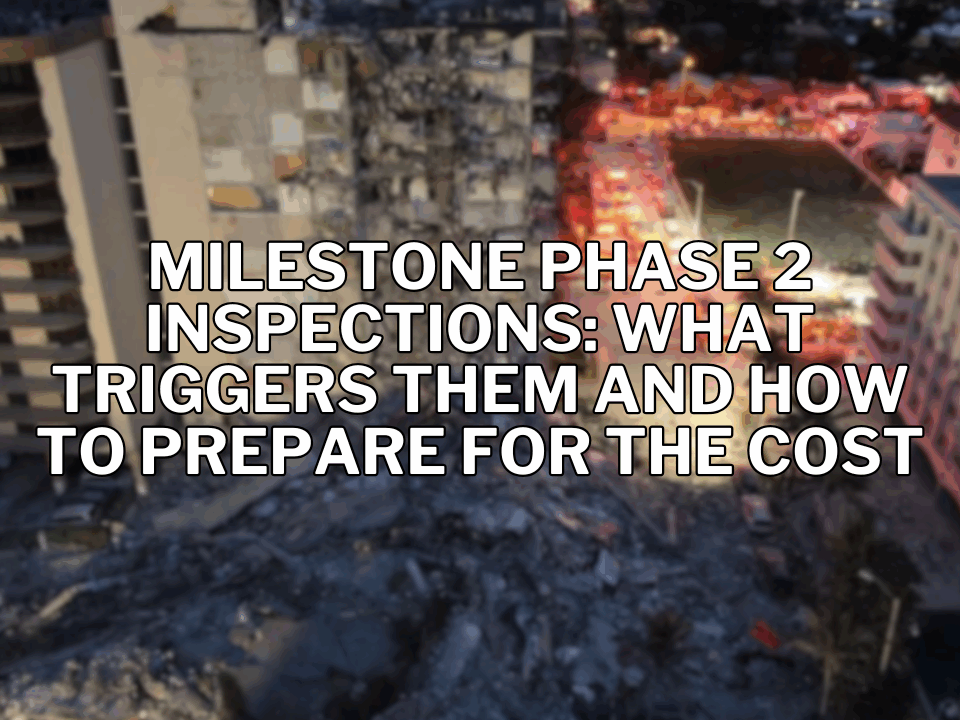Building inspections can bring about a sense of unease, with owners and managers facing the complexities of compliance and the safety of their structures.
What is the Florida milestone inspection – and what do you need to know to keep your building safe and compliant? You’ve come to the right place.
This inspection adds layers of regulatory demands that can seem daunting with its varying timelines, but Florida Engineering is here to walk you through the process every step of the way so you can enjoy peace of mind. We’ve taken the lead on 150,000 projects and saved our customers more than $45 million along the way.
Below, we’ll talk about inspection intervals, the importance of each assessment, and the indispensable role of a knowledgeable partner. But if you just want to get started preparing for an upcoming inspection, we encourage you to reach out today so we can discuss your Florida milestone inspection needs!
What is the Florida Milestone Inspection?
So, what is the Florida milestone inspection? This is a critical evaluation designed to ensure the structural and operational integrity of buildings as they age.
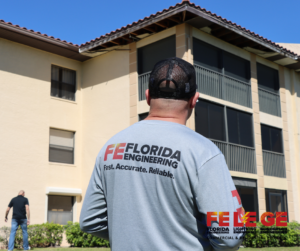
It’s a statutory requirement that involves a thorough assessment of a building’s load-bearing walls, primary structural members, and other vital components that contribute to its overall safety and stability.
The inspection must be conducted by licensed professionals, such as architects or engineers. These inspections are designed to catch any deterioration or potential hazards that could compromise a building’s structural health.
They’re like a comprehensive health check-up for your property, aimed at diagnosing issues before they become critical. You can think of them as preventative maintenance for your property.
You can avoid the need for more extensive and expensive repairs down the line by identifying and addressing issues early on. These inspections also provide peace of mind for owners, managers, and occupants alike, knowing that the building is safe and sound.
As the name suggests, there is more than one “milestone” inspection. So, how often are buildings inspected in Florida? Typically, buildings that are 30 years old – and every 10 years thereafter – must undergo a milestone inspection. However, the exact timing can vary depending on the building’s location and exposure to corrosive environments, such as saltwater.
For buildings within three miles of the coastline, the first inspection is required at 25 years. It’s not just residential properties that need to keep this schedule, either. Commercial buildings are also subject to these important inspections. Here are the most common timelines:
- 25 year recertification
- 30 year recertification
- 40 year recertification
- 50 year recertification
- 60 year recertification
We’ll get more detailed as to what you can expect before, during, and after the inspection in a moment. But first, we want to talk about what a difference the right professional can make as you embark on this journey.
The Role of a Reliable Partner When Performing Florida Milestone Inspections
While we recognize that property owners and managers see the Florida milestone inspection as a stressful, time-consuming obligation, you can change the narrative by investing in professional guidance.
A seasoned partner brings a wealth of knowledge to the table, understanding the nuances of state regulations and local building codes. Potential issues are spotted with precision through an experienced eye, and solutions are tailored to your building’s unique needs.
A reliable partner ensures every aspect of your building is up to par with current safety standards. This means a thorough review of electrical systems, plumbing, structural integrity, and more.
Professional oversight during inspections translates to a streamlined process, where every detail is accounted for. Your reliable partner coordinates the inspection logistics, communicates with all parties involved, and manages the necessary documentation.
This level of professional oversight means fewer headaches for you and a clear path to certification for your building. You can kick back and relax, focusing on other aspects of your property or spending more time on yourself.
That being said, who can you trust in Florida for help along the way? Look no further than Florida Engineering!
Why You Can Count on Florida Engineering’s Expert Guidance Along the Way
From the structural integrity reserve study in Florida to traditional reserve study in Florida, and even milestone inspections, our company has become the #1 choice among Florida property owners looking for guidance in keeping their buildings compliant and safe.
From towering luxury hotels to the most quaint residential pool enclosures, our portfolio of 75k completed projects spans a diverse range of structures, each benefiting from our depth of industry knowledge.
This experience translates into real-world savings for our clients, with an estimated $25 million conserved through our value engineering strategies. An investment in our expertise will pay for itself.
As one of the fastest-growing engineering firms in the country, we’ve established ourselves as a leader in the field, raising the bar for service excellence. Our family-owned business ethos means we treat every project with personal attention, ensuring your engineering needs are met with a touch of family pride.
Florida’s Top Engineering Firm
We’re not just about structural integrity, though. We provide a full suite of structural and MEP engineering services, catering to a wide array of clients. Our goal is simple: to be an indispensable resource to you, delivering on your engineering needs efficiently, affordably, and ahead of schedule.
We understand the importance of time, which is why we offer rapid turnaround times without compromising on quality. Our team of approximately 80 members across southwest Florida and ten other states is ready to provide you with quick quotes, typically within one business day.
So, why not reach out today to get the process started on the right foot? In the meantime, we’ll walk you through what you need to know before, during, and after the inspection below.
Preparing for a Florida Milestone Inspection
Start by conducting regular self-assessments of your property. This proactive approach can help you identify and address minor issues before they escalate into significant problems.
Consider scheduling routine maintenance checks, and make repairs as necessary to keep everything up to code. This not only makes the milestone inspection smoother but also extends the life of your building.
You should also prioritize good record-keeping. Ensure that you have all your building’s documents organized and accessible. This includes construction plans, permits, previous inspection reports, maintenance records, and repair documentation.
Having a digital backup of these records can be particularly helpful. Clear and thorough records can expedite the inspection process and provide inspectors with the necessary information to assess your building accurately.
There is also an element of anticipation that building owners should have. Stay informed about common issues that buildings of similar age and construction face. If you’re aware of any areas of concern in your building, address them before the inspection.
This not only shows the inspectors that you’re proactive but also that you prioritize the well-being of your building’s occupants. It means that issues won’t all pile up at once too – you can tackle repairs and replacements at a more manageable pace.
What to Expect During the Inspection
Your inspection day will begin with the arrival of a certified inspector, equipped with a keen eye for detail and a checklist that covers every inch of your building.
They’ll likely start with an introductory meeting to discuss the scope of the inspection, address any concerns you might have, and outline the process for the day.
They’ll scrutinize the foundation, ensuring it’s solid and free from significant cracks or shifts. The roof will be checked for proper installation and signs of leaks or damage.
Electrical systems, plumbing, HVAC units, and other mechanical systems will all undergo a thorough examination to verify they’re up to code and functioning correctly.
Inside the building, the inspector will check walls, ceilings, and floors for integrity and safety. Windows and doors will be assessed for proper installation and insulation. Fire safety features, such as extinguishers, alarms, and sprinkler systems, will be tested to confirm they’re in working order.
Outside, the inspector will evaluate the exterior walls, landscaping, and any additional structures, like parking lots or detached garages, for issues that could affect the building’s safety or value.
Throughout the inspection, a good inspector will keep you in the loop, pointing out findings and explaining their significance. This collaborative approach ensures that you’re not just a bystander but an active participant in understanding the health of your building.
Once the inspection is complete, the inspector will compile their findings into a detailed report. This document is a valuable asset, providing a comprehensive overview of the condition of your building and highlighting any areas that need attention.
The report may also offer recommendations for repairs or improvements, giving you a roadmap for maintaining your building’s safety and value. This is where your next steps become important as a property owner or building manager…
Next Steps After the Inspection
Review the inspection report thoroughly, noting any areas that require immediate attention, as well as those that might need monitoring or future action. If anything in the report isn’t crystal clear, don’t hesitate to reach out to your inspector for clarification. Understanding the report is key to making informed decisions.
Prioritize any repairs or maintenance tasks based on their urgency. Safety-related issues, such as electrical hazards or structural weaknesses, should top your list. Don’t overlook the less critical items, though – they can escalate into major concerns if neglected.
Create a timeline for addressing these issues, keeping in mind any regulatory deadlines or seasonal considerations that may affect your ability to carry out repairs. Leverage professional expertise for repairs that are beyond the scope of your expertise or require specialized knowledge.
Whether it’s a structural engineer, an electrician, or a roofing contractor, ensure you’re hiring licensed and reputable experts to tackle the necessary work. Obtaining multiple quotes and references can help you make the best choice for your building’s needs and your budget.
As you make repairs and conduct maintenance, keep meticulous records of the work done, including dates, costs, and the professionals involved. This documentation will be invaluable for future inspections and can serve as proof of your proactive building management should any issues arise.
Finally, use the insights gained from the inspection to inform your long-term building maintenance plan. Regularly scheduled check-ups and preventative maintenance can help avoid the recurrence of issues and keep your building in top shape. Consider setting aside a budget for these tasks to ensure you’re always prepared.
Wrapping Up Our Beginner’s Guide to the Florida Milestone Inspection
So, what is the Florida milestone inspection? As you now know, it’s much more than just a regulatory hurdle or another item on your seemingly endless to-do list – it’s a pivotal step in ensuring the safety and longevity of your building.
Proactive measures, diligent record-keeping, and addressing potential challenges head-on can simplify the inspection process. Understand what to expect during the inspection, engage with it actively, and use the final report as a guide for prioritizing repairs and planning future maintenance.
Following these steps will not only help you navigate the inspection with ease but also protect your investment and provide peace of mind for everyone under your roof.
Our blog has more resources on topics like the milestone inspection Florida cost, new Florida condo laws in 2024, what is a reserve study, and more. But at this point, why not take the first step to crossing this inspection off your to-do list by reaching out to Florida Engineering?
Don’t wait for the waves to come crashing in – reach out to us today for expert guidance on sailing through your Florida Milestone Inspection with flying colors!
The process of ensuring the ongoing safety and compliance of your building is just beginning after the 40-year inspection is completed. Here are the vital steps to follow post-inspection with Florida Engineering:
- Understanding the Inspection Report: Our comprehensive inspection report is more than just a document; it’s a roadmap for your building’s future. We ensure that it is clear and detailed, explaining the current state of your building, highlighting areas of concern, and providing practical recommendations. Our engineers are available to walk you through the report, ensuring you fully understand each aspect.
- Prioritizing Recommended Actions: Based on the report, you may need to undertake repairs or upgrades. We help prioritize these actions, focusing first on critical safety issues. This prioritization is crucial for managing your resources effectively and addressing the most urgent needs.
- Planning and Implementing Repairs: If repairs or upgrades are needed, we guide you through the planning process. This includes helping you understand the scope of work, timelines, and potential costs. Our expertise extends to assisting in the selection of contractors and overseeing the repair work to ensure it meets the required standards.
- Compliance Documentation: Once repairs and upgrades are completed, documenting these changes is crucial. We assist in compiling a comprehensive compliance report, showcasing that all necessary actions have been taken and that your building now meets or exceeds safety standards.
- Regular Maintenance and Monitoring: Compliance is not a one-time event but an ongoing commitment. We advise on setting up a regular maintenance schedule to keep your building in top condition. This proactive approach helps in identifying potential issues before they become significant problems.
- Future Inspections and Continuous Improvement: Looking ahead, we prepare you for future inspections and continuous improvement of your building. This long-term view ensures that your property remains a safe, welcoming, and compliant space for its occupants.
By following these post-inspection steps with Florida Engineering, you are not only ensuring compliance but also actively enhancing the safety and longevity of your building. So, get started today as we wrap up this guide on the 40-year Florida building inspection!
Bringing Our Conversation on the 40-Year Florida Building Inspection to a Close
So, what is the 40-year inspection in Florida? This crucial assessment helps safeguard the structural integrity and electrical safety of your property, not just keeping the public safe but protecting your investment as well.
The expertise of a trusted partner like Florida Engineering becomes invaluable in navigating this process. With our experienced team, comprehensive approach, and commitment to excellence, we ensure your building not only meets but exceeds safety standards
Our blog has more resources like what is a reserve study, the Florida milestone inspection cost, how often are buildings inspected in Florida, new Florida condo laws in 2024, and more. We’re your trusted source for all things Florida building inspection and compliance. That being said, why not get this task crossed off your to-do list today?
Begin your journey towards compliance and peace of mind today by contacting Florida Engineering. Let’s ensure your building’s safety together!

